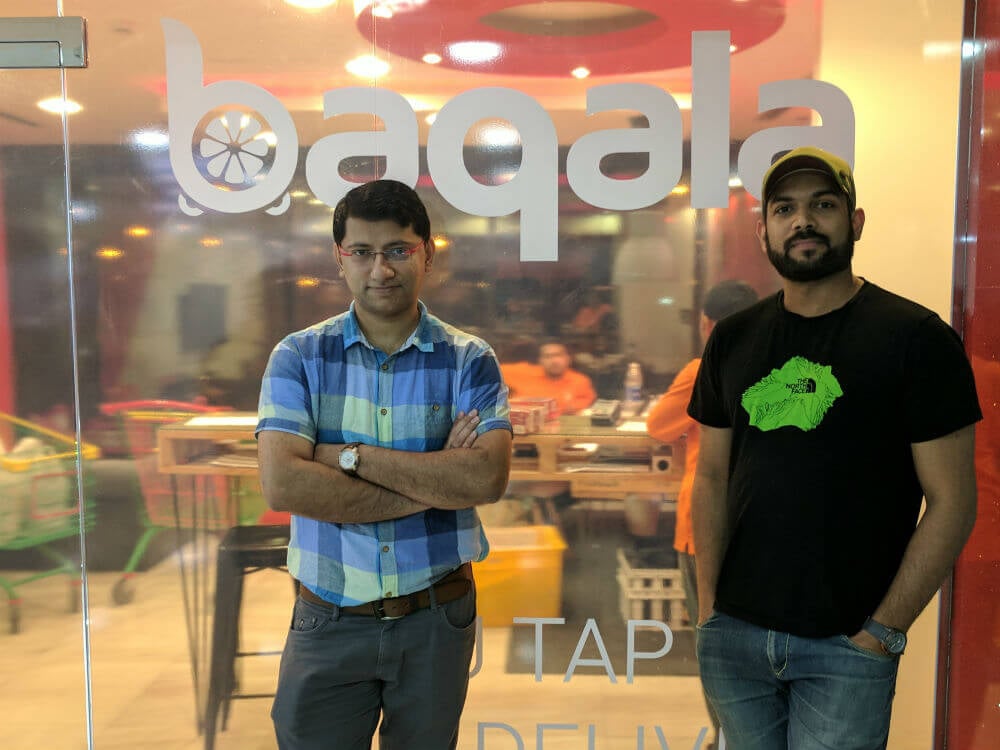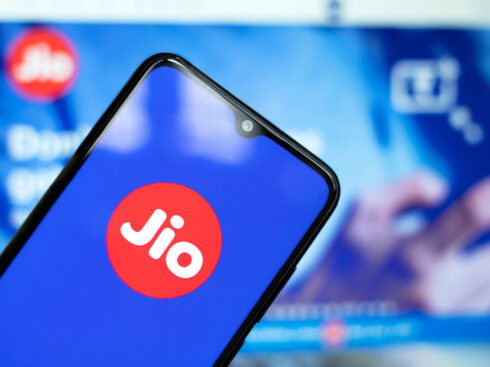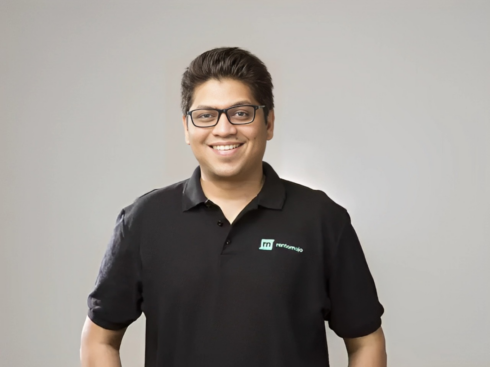SUMMARY
GetBaqala Cofounder Amjad Puliyali Spills The Beans On Why Bahrain Is A Gateway To The GCC
Amjad Puliyali, co-founder of online grocery delivery startup GetBaqala based out of Bahrain, comes from a digital background. After moving to UAE to build his professional career, Amjad ended up gaining insights in the domains of digital, growth, performance, big data and personalisation. He was mainly consulting startups and businesses (in ecommerce and travel) like Etihad Airways, Souq.com, Careem, Namshi etc.
Amjad also had the chance of working with many Indian data-driven companies like Vizury. Working with Vizury, in fact, was a big learning experience for him. During his tenure in the company, he got a chance to expand the company’s business to the Middle East and Africa. And thus, when Amjad was raring to set up his own startup in the Middle East, it was the digital medium, data and mobile that intrigued him.
“One of the biggest trends in the Middle East was mobile which was picking up in all markets. As we looked at trends across the globe and compared them with the local opportunity in markets like Saudi Arabia and Bahrain, one of the things that struck us was people are looking for grocery delivery services in these markets. Everywhere else in the world you have online grocery delivery but in this region. So we saw an opportunity here. We noticed that in Bahrain and Saudi Arabia there has been 400% year-on-year growth in the search itself. Of course in ecommerce there are already big guys like Souq.com (acquired by Amazon this year) which have a presence in the region but we wanted to focus on hyperlocal and mobile as a key element,” reveals Amjad.
So Amjad quit his job and scouted for a market to test out the hyperlocal space. Though Amjad has lived in Dubai for 10 years yet set up a startup was an expensive proposition in the country. That’s when Amjad met Dharmi Magdani, Economic Development Board Of Bahrain (EDB)’s India country manager in India and Bahrain came into the picture.
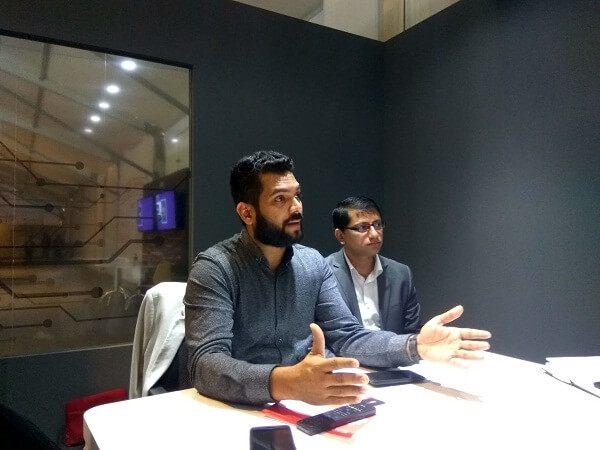
Says Amjad, “Obviously I had my reservations as to why would I go to Bahrain which is the smallest market in the Middle East. However, there were some very definite advantages.” Saudi Arabia is just 30 minutes away from Bahrain. So testing the product in Bahrain before entering Saudi Arabia made sense. More so because the customer behaviour is the same from the Arab audience. With an Internet penetration of almost 95% and a mobile penetration of 120%, it just seemed to have the right metrics in place as well.
“But it was when we heard about the incredible support system Bahrain had for startups, that sealed the deal for us. We were sitting in Bengaluru when we were applying for the company license. It all happened to them,” he reveals.
So Amjad only had to visit Bahrain once to sign documents and GetBaqala, founded along with co-founder Aboobacker Shinan, was up and running.
How EDB And The Government Are Helping Build A Robust Startup Ecosystem In Bahrain
Speaking about the measures undertaken by EDB for the supporting the startup ecosystem in Bahrain, Amjad reveals that EDB was instrumental in getting the startup a virtual space, helped it to get legally paper wise ready, and arranged visas for the team. So GetBaqala moved in to test out the market without any hassle.
The startup also got selected for Bahrain Development Bank’s 12-month accelerator program Seed Fuel which provided it funding to the tune of $66K (BHD 25,000).
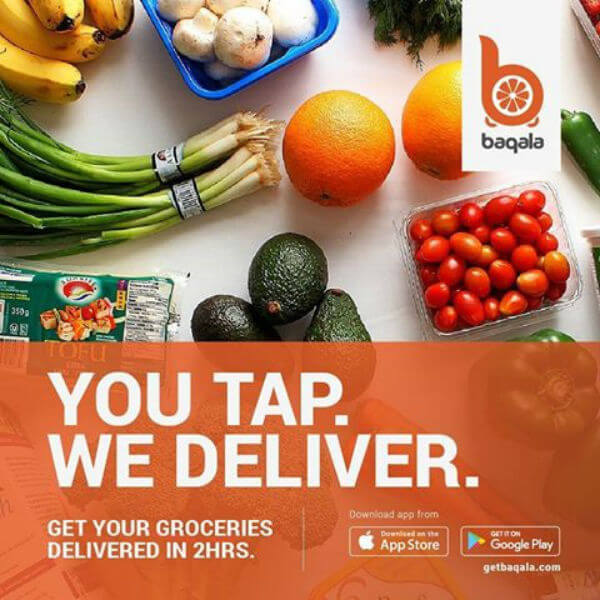
Besides EDB, GetBaqala also received major government support from Tamkeen, an organisation tasked with developing Bahrain’s private sector and positioning it as the key driver of the economic development programme. Under Tamkeen’s subsidy program for startups, the organisation hires Bahrainis and pays 70% of their salaries. Thus, with the support of the government GetBaqala has hired fresh polytechnic graduates and is sending them Bengaluru for six month training. Tamkeen is providing all the support, starting from accommodation to travel for them, their six months’ salary, as well as ICT support. Out of its 12 member team, four in the technology and development team are in India. Not only that, the startup has also been provided rent subsidy for a year in Bahrain.
Amjad reveals, “For both me and my co-founder, Bahrain was new. Dubai was our natural choice even though lifestyle is expensive in Dubai but it has access to a big market and has potential. However our runaway increased easily from three to nine months by choosing Bahrain. Also, we liked the fact of being nimble and simple in the beginning.”
Ease of capital was yet another attractive feature for the duo to move to Bahrain. That’s because the Bahrain government has reduced the capital requirement from $53K (BHD 20K) to as low as $3K (BHD1K) for businesses and even lower than that in some cases. Hence GetBaqala started off with $3K (BHD1K) capital which now has grown to $266K (BHD100K).
GetBaqala: The Journey From Inception To 20k+ Downloads
And thus, GetBaqala initially started as an online grocery delivery platform. When a user places an order the platform maps it to the nearest grocery outlet to him. However, now it has reiterated on the model, as, Amjad felt that it is not going to scale. Given that the price is defined by the grocery guy, the startup does not have any leverage on that and dependency on delivery is with him. Hence it made sense for GetBaqala to pivot from managing their entire delivery.
Explains Amjad, “It makes sense for us to own last-mile logistics as that is the only point of interaction we have with our consumers physically. If I don’t optimise that experience with my consumer, I am not going to win that trust back. And especially when it comes to food, it is all about trust. We are breaking his relationship with supermarkets over the last 10-15 years to trust us on quality and delivery. So I need to build that same trust so that people know that with us, delivery is on time and quality is maintained. We will take it back on the spot if you don’t like the product. Also, consumers can rate immediately on the app if a delivery experience has gone wrong.”
Also, the startup moved away from multiple grocery partners, consolidating to one of the largest hypermarkets in the GCC (signed NDA with them). Eventually, this partnership will help it access other GCC markets as well. Now in addition to the mobile app for customers to place an order, it also offers its shoppers an app like Instacart in the US. The Shopper app is basically an internal app, where the startup has part-time and full-time shoppers shopping for the orders placed by their customers with their partner stores. The startup carefully hires and trains shoppers; they are a part of the team. Delivery App, is another app only for the delivery boys, where the customer’s address/delivery location and real-time tracking is enabled. The app enables the startup to do two hours delivery. The startup keeps the Shoppers and Delivery team separate.
As the startup wants to be asset and inventory light, the majority of the sourcing of goods is still under the care of the hypermarket. However it does source some of the products individually, thus operating a hybrid model. The idea is to keep products with short shelf life with the partners while the startup sources some of the long life products which they don’t have. These normally include speciality offerings like vegan products or the likes.
As of last month, GetBaqala claims to have crossed 20,000+ downloads without spending a penny on marketing or advertising. Out of these, over 10,000 are monthly active customers. It boasts of a good retention rate of 70%, which means basically 2.8 times a month, consumers shop on the platform. Average order size has since inception increased from $13 (BHD5) to $48 (BHD18) with the addition of more categories.
Amjad also claims to have a customer acquisition cost to lifetime value ratio as 1:10X. Meanwhile, revenues have grown 40% month on month. He adds beaming, “It took us 10 months to reach our first $100K, but the next $100K came in 2.5 months.”
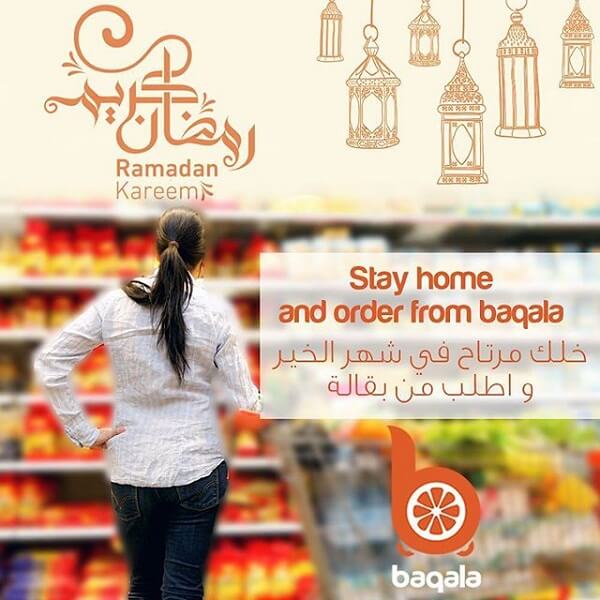
It is this compelling story, which comes without even raising a seed round, which has made Silicon Valley investors interested in pumping in Series A funding in the startup!
But Amjad is not worried about the inflow of funding. While Bahrain has lack of active tech investors unlike India, however funds are pouring into the ecosystem. And one of the most crucial ones would be the $100 Mn Fund of funds announced by the government.
He adds, “Funds are coming into the ecosystem, so we are not worried about that. Our vision is to become the number one mobile commerce platform so that anyone can come and list any product with us, and sell it to consumers in two hours.”
When one compares GetBaqala’s model with Grofers or BigBasket in India, the duo follow a similar model but minus the Shoppers app. However, neither of them promise a straight two hour delivery for every order, rather ask the customer for the preferred time slot from the customer to make the delivery.
A $15 Bn Online Grocery Market In The Middle East
Amjad offers an interesting comparison. “Bahrain as a market is 1 Mn+, which is half of Koramangala! But the consumer spending is 4X of that in India.” Having spoken to Indian companies in grocery including the ones that failed (Peppertap), Amjad believes that GetBaqala has a significant core base it can experiment on in Bahrain.
And once they develop this base, there is a larger pool of audience in neighbouring countries like Dammam, Kuwait and other GCC members. Even in Bahrain, he expects 5% of the people to move to the online grocery.
He reveals, “Latest reports show that by 2018, Middle East grocery commerce potential is $15 Bn. Grocery offline in GCC is a $325 Bn + opportunity. Think of even 1% shifting online!” Ecommerce is expected to grow 40% to $41.5 Bn in 2020 in GCC.
Meanwhile in Bahrain, offline retail is a $2 Bn+ market which is only 2% of the entire GCC market. GetBaqala is aiming for a 5% of this market in the next three years.
“So even if it is the smallest market, it is a $50 Mn opportunity for us,” he concludes.

When one compares with India, as per a Goldman Sachs report, “The domestic online retail industry is evolving into a hyperlocal, on-demand market. India’s ecommerce market is estimated to grow 15 times to $300 Bn by 2030.” The Indian online grocery market is estimated to reach $40 Mn (INR 270 Cr) by FY ’19 growing at a CAGR of 62% from 2016 to 2022. As per the report, Morgan Stanley expects the online grocery and food segment to become the fastest-growing segment, expanding at a compounded annual growth rate of 141% by 2020.
On the same lines, GetBaqala will stay focused on online grocery as it is the fastest moving segment in Bahrain as well. And look to moving into neighbouring countries. For instance, neighbouring Dammam – the capital of the Eastern Province of Saudi Arabia – which Amjad believes is another beast altogether. And thus GetBaqala aims to tame this beast in the next six to nine months.
But how about the competition in Bahrain itself?
Amjad reveals, “When we started in September in last year, we were the only one present. Now there are 5 players who are into online grocery. Howe, er we are winning on certain key differentiators.” Some of the players delivering online grocery now include Wafiapps.com, Alosraonline.com to name a few along with incumbent retailers like Jawad Group which have recently launched their own mobile app for grocery delivery.
One of them is that GetBaqala does not have a minimum order. So a customer can even order a single bottle of water. However, it encourages customers to buy bulk so that they can save up funds on delivery. If the order size is less than $13(BHD5), it charges $1.33(500 fils, 1 BHD=1000 fils) and for order sizes more than BHD5, the delivery becomes free. In addition, it has multiple payment options and has recently added benefit pay mobile to them.
Adds Amjad, “In India, money is coming in, you will have 10 players in Bengaluru alone. So obviously in comparison, Bahrain is less risky when it comes to hyperlocal.”
But Amjad is also not sceptical of bigger players like Alibaba, Amazon or investors like SoftBank coming into the region, who have mostly ignored it because of geopolitical tensions.
Explains Amjad, “Even if bigger players come to Bahrain, we see it as an opportunity than a threat. Because in that event, we might prove a favourable acquisition target, having done the groundwork for them much earlier on.”
While the founder of online grocery delivery startup, Amjad, may not be far off from the point, right now the problem for tech startups like GetBaqala is convincing investors of the tech story. Investors traditionally have been investing only in the real estate, oil, and manufacturing sector in Bahrain. While EDB and the government of Bahrain are leaving no stone unturned to bolster the startup ecosystem in Bahrain, ultimately how convinced will be the investors to reroute their money into the Bahrain’s developing startup ecosystem is the real test for the country’s tech startups.
The writer was in Bahrain on a sponsored trip by the Economic Development Board of Bahrain.
[This article is part of Inc42’s series on Bahrain where we will be covering the Bahrain startup ecosystem in detail. Stay tuned for the next article.]



